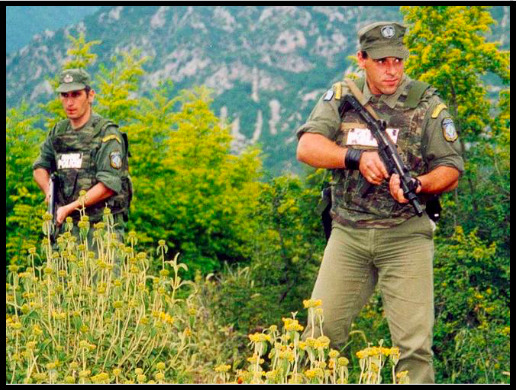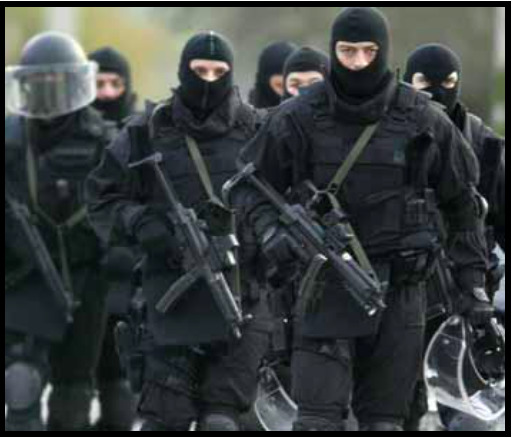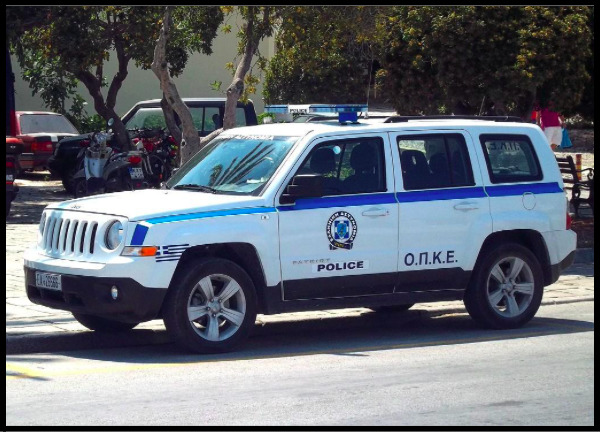On the 11th of April near the town of Didymeticho, Greece, a 30-year-old Algerian man and 75 other men and women were pushed back from Greece to Turkey.
On the 8th of April, the respondent set out for the Turkish border with five other men, three from Syria, one from Algeria, and one minor from Iran. After crossing the border, the group of six headed west – navigating their way through the Greek mountains and forests until reaching Lagos, nearly three days later. While resting near the outskirts of the town around 2:00 a.m., the transit group heard sounds of a vehicle along the unpaved road followed by a blinding light. What trailed closely behind were seven men dressed in three distinct uniforms.
Three reportedly wore sage green clothes including a logo on the arm and ‘Police’ written in small white letters in Greek, confirmed by the respondent as matching the uniforms in Image 1; two wore dark blue trousers and shirts with ‘Police’ written in English on their chests; and the remaining two men were dressed head-to-toe in black and wore balaclavas, verified by the respondent as similar to the uniforms displayed in Image 2.
Parked near them was one blue and white jeep resembling a Greek police vehicle, also confirmed by the respondent as matching the vehicle in Image 3. Moreover, there was a black, unmarked pick-up truck present at the apprehension point.



They yelled at the six members of the transit group in English – demanding that they come out of hiding. When in plain sight, the group were forced to their knees and told to put their hands behind their heads, recalled the respondent. Immediately after, the three men in green uniforms and the two in blue reportedly began kicking and beating the group with metal batons. The beating was reportedly random, hitting all parts of the men’s bodies. When the beatings subsided, they were reportedly forced to hand over their phones and were questioned about their crossing point as well as their nationalities. The respondent described that “we only answered what they asked us and [then] told them we want to go to Europe. For that, [the man in the all-black uniform] started kicking me.” They were left like this – beaten, cold, exhausted, and humiliated – for 45 minutes.
When the respondent tried to ask for asylum, they reportedly ignored his request and kicked him.
At approximately 2:45 a.m., a white van appeared at the apprehension spot. The vehicle was reportedly old, unmarked, and had no license plates. The respondent and his five friends were loaded into the back of the van. The trunk measured around three-by-two meters wide. There were no other people already present in the car, recalled the respondent. The doors closed, and the van took off fast down the road for about 25 minutes.
When the vehicle stopped, the six men were unloaded from the van. Outside, the respondent reportedly saw an old, white building protected by a three-meter fence. In the front stood a flag resembling the Greek flag. Mixed in with the rubbish was a pile of backpacks, water, and food.
Near the front, the respondent confirmed that two additional, unmarked white vans were present. Other than a few residential houses and caravans, the building was surrounded only by forest. When they entered the building, they were met by seven additional uniformed men and one uniformed woman. All dressed in the same sage green uniform worn by three of the seven men at the apprehension site (see Image 1). The respondent reported that when he got out of the van, “[the men in sage uniforms] asked us to step near to the wall of the building.” With gloves on, the men approached the group and told them to remove their trousers, underwear, shirts, and jackets. Standing there fully naked, the men in sage green then searched them from head to toe, as well as every piece of their clothing.
The men in uniform addressed the transit group in English. Unable to understand everything being said, the respondent’s friend turned to him – imploring him to translate what was being told to them. When the respondent tried to explain, one of the men in uniform reportedly punched the respondent in the face. Still naked, the beating continued, described the respondent. The minor – only fifteen – reportedly had his head slammed against the wall over and over by the men in uniform. The violence lasted around 15 minutes. When the search ended, the group were given their money back along with their shirts and trousers. Their jackets and shoes, they were told, would remain with the men in uniform.
Thereafter, they were led into a small, five-by-three meter cell. The faces of 70 other individuals filled the room. Among them were reportedly people ranging from 15 to 45 years old from Morocco, Syria, Afghanistan, Iraq, Yemen, and likely somewhere from the African continent. Four women and around 17 minors were present. Inside the cell, the respondent reported that the walls were “old and dirty with names written on them.” Two bunk bed frames were set up, yet no mattress accompanied them. The air was filled with the smell of urine, recalled the respondent.
The time was around 4:00 a.m. on the 11th of April.
Nearly 17 hours later, the group of 76 was released from the cell. Outside of the detention site stood nine men dressed in civilian clothing and balaclavas and two other men in a dark blue uniforms. The same two white vans mentioned earlier were still parked near the entrance of the detention site. Around 33 people were reportedly loaded into each van. When asked about the conditions of the vehicle, the respondent reported that he could hardly breathe. He continued, describing that, “we had to cover the women and try to not let them get hurt or beaten, [but] one of the men wearing a blue uniform slapped [a] young girl to get her to move faster.” Although packed with people, the van’s driver reportedly drove extremely fast. Nothing outside was visible.
Around 30 minutes later the engines quieted and trunk doors swung open. Outside, the respondent reported a small, unpaved road surrounded by a large forest near a one-meter fence and a boat near the river’s edge. On the other side of the fence, everything was dark. Around 13 men in uniform stood waiting for the vans – four of whom were dressed in dark blue uniforms, two in camouflage with a flag resembling the Greek flag on the arm, and the remaining seven in civilian clothing with balaclavas. One man in civilian clothing reportedly wore a green jacket with a Turkish flag on the arm. The men in camouflage reportedly carried large firearms with them.
The men in balaclavas told the group to lie on the ground in a line and remain silent. When addressing the group, the men in civilian clothing and balaclavas reportedly spoke in Arabic with a Syrian dialect. The transit group, including the respondent, were then reportedly ordered to crawl towards the boat and stand in a line. One by one, they were, again, searched.
Before the search, one of the men in civilian clothing reportedly told the respondent to “please give everything [you have hidden] or you will get beaten again.” According to the respondent, the men in civilian clothing then began passing each individual, collecting their belongings; the respondent handed over 50 Euros. The men in dark blue uniforms then gathered the items in a pile at the end. Females and males were searched by the uniformed men. While searching each person, the men in civilian clothing reportedly kicked the respondent “any chance they got” while also beating him with a branch. One of the masked men then reportedly punched him in the face. When the respondent’s friend couldn’t understand what was being said, he turned again to the respondent – asking him to translate. The men in civilian clothing responded by taking him out of the line and beating him with a metal road while kicking him for nearly five minutes, described the respondent.
A camouflage rubber boat with a flag resembling the Greek flag on the side waited near the edge of the river. One hour later – when the beatings subsided – the groups were loaded into the boat, nine people at a time. Using paddles, the two drivers navigated the boat to the middle of the river where the individuals were then told to jump in. The water reached around mid-chest and some of the people could not swim.
The time was approximately 10:30 p.m. on the 11th of April.
Once he reached Turkish soil, the respondent headed into the darkness with no sense of where he had landed. After a short walk, he found his friend. Together, they continued into the forest. A way in, they came across a farmer, but when the respondent tried to ask for help, the farmer reportedly pushed him. The two men continued forward through the farmland hoping to, at some point, reach Edirne. In another small town they asked for food and water. The local refused.
Two days later, they reached Edirne.
During the entirety of their detention in the detention site, they were offered no food, water, translator, or medical support. Neither fingerprints nor photos were taken.
